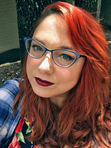E. Kristin Anderson's Blog, page 16
September 12, 2014
Banned Books Month: Guest Post from Helaine Becker: Going Orwell on Your Own Kids
What??? They banned TO KILL A MOCKINGBIRD? Again???
Don’t sweat it. There’s an even more outrageous act of book banning going on. Under our very noses. Every day.
I’m referring to parents who ‘pre-reads’ books for their kids. Who selects ‘appropriate titles’ for their tots. Who nay-says their choices that are too hard/too easy/too scary/too disturbing/too silly/too dumb.
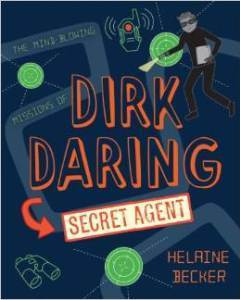
Orca Books, October 2014.
I get it – I’m a parent too. I know that middle-of-the-night-staring-at-the-ceiling thing, thinking, “My God! I’m not doing ENOUGH!!!”
So you stuff your kids’ lunch bags with healthy superfoods (Chia! Hemp!), fill their days with stimulating activity (Karate! Chess!). And make sure all their reading material passes muster (Newbery! Caldecott!).
But it’s counterproductive. Evil, even, when you pre-censor your kids’ books.
You’ve gone Orwell on your own kid.
“But wait!” you say. “I’m only trying to protect them! Letting a kid make their own decisions is risky. They might make: GACK! Mistakes!!!”
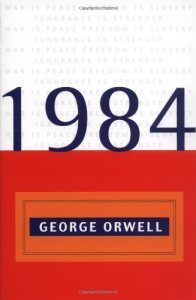
Plume, 60th Anniversary Edition.
So in the name of love, you infiltrate your child’s mind. You become a censor, robbing your kids of freedom, autonomy, and the chance to grow.
But kids need autonomy. They need to make their own choices, and their own mistakes. And in this crazy modern world, there are almost no places left for kids to do so.
Except, perhaps, in the world of books. When a child chooses reading material on their own, they experience the rare opportunity to be free. To follow their own hearts, instincts, moods, interests, passing fancies. To be alive to themselves.
Of course it’s risky. They might choose a book that rattles them to their core. Or makes them see the world from an entirely new perspective. They might – EGAD – learn about sex or pain or really creepy people.
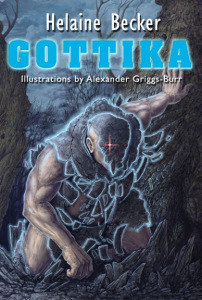
Dancing Cat Books, April 2014.
“So what?” I say. It will, in fact, be GOOD for them. Wildly, fantastically, hugely good.
As you may have guessed, no one selected or censored the books I read as a kid. I read lousy books and dirty books. Beautiful books and goofy books. Books with pictures and magazines with words and no pictures. I read my Dad’s Scientific American and my mom’s McCalls. I read biographies, how-tos, comedy, romance, suspense, horror, poetry. Fredericks of Hollywood catalogues, the backs of soup cans, Mad.
None of it hurt me. All of it made me the person I am today. A voracious reader (still). A committed writer. A determined thinker-of-thoughts and fighter-for-rights.
So to all the well-meaning parents out there who are book banners in your own homes, I say, “let it go!” Trust your child to choose books that are right for her. She’s up to the challenge. Really.
Now go relax. With a nice, trashy novel. It’s ok — I’ll let you.
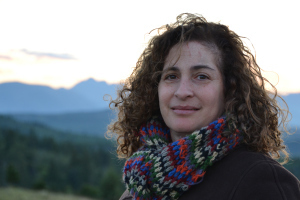
Helaine Becker
Helaine Becker is the best-selling author of more than 60 books for children and teens, including the #1 Canadian national bestseller A PORCUPINE IN A PINE TREE. Her most recent titles are GOTTIKA (Dancing Cat Books), and DIRK DARING, SECRET AGENT (Orca Books).





September 11, 2014
Banned Books Month: Guest Post from Jessica Verday: On the Pursuit of Knowledge
Although OF MONSTERS AND MADNESS isn’t a book that deals directly with censorship or reading banned books, it is about Annabel Lee (yes, THE Annabel Lee from Edgar Allan Poe’s famous poem) and her life in 1826 Philadelphia. Annabel isn’t like other girls her age — she has dreams and ambitions and more importantly, a goal in life that during that time period is essentially banned. In OF MONSTERS AND MADNESS, Annabel Lee dreams of becoming a surgeon.
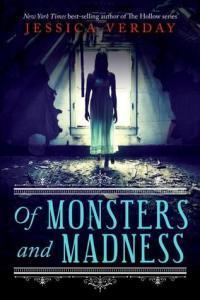
Egmont USA, September 2014.
Not only is it considered highly improper in 1826 for a woman to want more out of life than to simply be married off, it’s illegal for women to practice medicine. Annabel is forced to learn how to deal with the constraints of a society that have banned her from pursuing that which she loves simply because of her gender.
It was an eye-opening experience to research this book as I was writing it and to learn just how much women had to fight to be recognized — and, at first, even allowed — as equals in the field of medicine. And I think it’s fascinating that while on the surface, banning someone from pursuing their dreams of a career and banning someone from reading a book appear to have little in common, yet they both share the same lesson: The pursuit of knowledge, in any shape or form, is something that should never be censored.
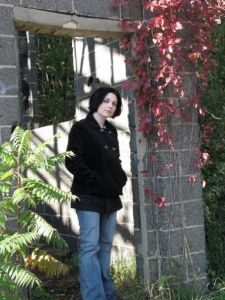
Jessica Verday.
Jessica Verday is the New York Times best-selling author of The Hollow trilogy. She wrote the first draft of THE HOLLOW by hand, using thirteen spiral-bound notebooks and fifteen black pens. The first draft of THE HAUNTED took fifteen spiral-bound notebooks and twenty black pens. THE HIDDEN took too many notebooks and too many pens to count. She lives in Goodlettsville, Tennessee, with her husband. You can visit her online at www.jessicaverday.com.





September 10, 2014
Banned Books Month: Guest Post from Monique Polak: Books Test Limits
People become writers for lots of reasons.
I used to hide under the dining room table when my parents had company for dinner – it was the best place for hearing stories.
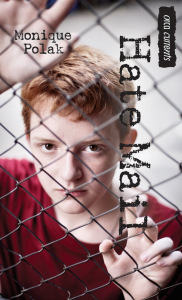
Orca Currents, September 2014.
That may be one of the reasons I became a writer.
Another was that my room was the little blue one upstairs where my parents stored their books.
I still remember the titles of some of the paperbacks on the white wooden shelves behind my bed. ROSEMARY’S BABY. THE SECRET OF SANTA VITTORIA. OF HUMAN BONDAGE. I liked St. Thomas Aquinas’s SUMMA THEOLOGICA best because it had a black leather cover and inside, a silky red ribbon to mark the page I was on.
I read those books. Of course, there was a lot in them I did not understand. But I knew they were important, that stories mattered, and that words could do magical things, like making worlds come alive. And my parents never ever – not even once – forbid me from reading those books. Just as they never told me to get out from the under the table where I was eavesdropping, even though they must have known I was there.
Today, I am the author of 16 novels for young adults and I have taught English Literature at Marianopolis College here in Montreal for 30 years. I am also against banning any book ever.
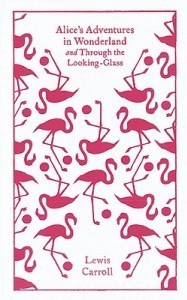
Penguin Classics Hardcover Edition, March 2010.
My favorite book of all time, Lewis Carroll’s ALICE’S ADVENTURES IN WONDERLAND, was banned in New Hampshire in 1900 and in China in 1931. People objected to the book’s references to sex and drugs.
I wrote my Master’s thesis on ALICE. By the time my friends in the English Department were halfway through their graduate work, they were sick of their subjects. That never happened to me. I am not exaggerating when I tell you I have read ALICE’S ADVENTURES IN WONDERLAND more than 200 times – and that every time I read it, I learn something new.
In ALICE, the caterpillar (yes, he is smoking a hookah pipe and yes, he is sitting on a mushroom) asks Alice, “Who in the world are you?” There can, I think, be no more important – or difficult – question. When I teach the book to teenagers, I use it in part to discuss the complex issue of identity. Like Alice, we are constantly changing, and yet, some essential part of us remains the same. I also use it to discuss both sex and drugs, subjects that, in my mind, need to be calmly and openly talked about in the classroom.
I happen to teach at the same college I attended when I was my students’ age – and I can still remember what I wanted to know when I was seventeen and eighteen. These are the questions I try to address in my classroom – and also in my fiction writing.
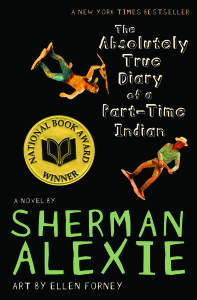
Little, Brown Books for Young Readers, September 2007.
A book I fell in love with more recently, Sherman Alexie’s THE ABSOLUTELY TRUE DIARY OF A PART-TIME INDIAN, was banned earlier this year in Idaho schools. There, authorities argued that the book should be banned because it contained “filthy words” and alluded to masturbation.
There is swearing in The Absolutely True Diary of a Part-Time Indian and there are references to masturbation. All that is fine with me. Most teens I know swear – and they are all curious about masturbation, another topic too seldom discussed in the classroom.
But there is way more to Alexie’s novel. The narrator, Arnold Spirit, is Native American. He lives on a reservation in Washington State, but is bussed to a school where the other students are white. What this book is really about is racism, prejudice and overcoming adversity – subjects that readers of all ages need to know about and think about, and which are particularly, painfully relevant in the wake of such recent events as those that took place in Ferguson, Missouri.
Like many youngsters, Arnold faces terrible obstacles. Luckily, Arnold finds solace in drawing cartoons and in reading. Here is one of the things Arnold has to say about reading: “I grabbed my book and opened it up. I wanted to smell it. Heck, I wanted to kiss it. Yes, kiss it. That’s right, I am a book kisser. Maybe that’s kind of perverted or maybe it’s just romantic and highly intelligent.”
Alexie’s book will break readers’ hearts. It will also make them laugh out loud in spots. I laughed out loud when I read Arnold describe himself as “a book kisser.”
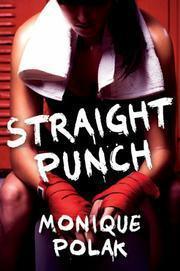
Orca Books, March 2014.
Books can open us up to other lives and other experiences. Through them, we can learn about subjects we are curious about, as well as subjects we might never have thought about were it not for some particular book.
I often tell my students that books – both reading and writing them – have saved my life. In my saddest, most lost moments, I have, like Arnold Spirit, found comfort in stories.
Here’s my message to young readers: Read! Read everything you can, everything you are interested in, and even what may seem less interesting.
And here’s my message to parents and educators: Encourage young people to read and to write – without limits, without bans. Do everything you can to try and turn them all into book kissers.
Monique Polak is the author of 16 novels for young adults, the most recent of which is HATE MAIL (Orca Book Publishers). Her historical novel WHAT WORLD IS LEFT won the 2009 Quebec Writers’ Federation Prize for Children’s and YA Literature. Monique is a frequent contributor to the Montreal Gazette and to Postmedia publications across Canada. She is also a columnist on ICI Radio-Canada’s Plus on est de fous, plus on lit! Monique has taught English and Humanities at Marianopolis College in Montreal for 30 years. Learn more about her work by visiting www.moniquepolak.com





September 9, 2014
Banned Books Month: Guest Post from E.K. Johnston: Missing the Catcher

Little, Brown and Company, Mass Market Edition, May 1991.
The history of banned books in my school board is pretty grim. Once upon a time, there had been a public meeting to ban Alice Munro’s LIVES OF GIRLS AND WOMEN. The CBC had shown up to film it, bringing some of the most recognizable names in Canadian culture to my small town, but despite Alice Munro’s defense of her work and the fact that Alice Munro was a local, the book was struck from the reading list.She has never come back to the building, as far as I know, and who can blame her?
So getting a book un-banned was kind of a big deal. We were all pretty thrilled. I mean, if it had been banned, it was probably exciting! And we were going to be the first class to read it. (Aside: the other profoundly exciting thing was that CATCHER was the first and only new book I ever had while I was in high school. Most of the others were from the 60s or 70s.) Anyway, we prepared for this momentous event by first studying FAHRENHEIT 451, for obvious reasons, and Mr. Y told us about JD Salinger and gave us the context for the work. This only served to heighten the anticipation, and so when our brand spanking new copies of CATCHER were handed out the day before Christmas break, we were all at fever pitch.
I read CATCHER IN THE RYE a few days after Christmas. I gave up a day of skiing, and skipped TOY STORY 2. I read the whole thing cover to cover.
And I was crushed.
I found it tedious. Boring. Obnoxious. Frustrating. I thought it was awful.
After the holiday, I found out that I was not the only person who felt that way. The whole class, or at least the ones who had done their homework, was similarly let down. We had thought that we were going to read something important. Something that was so devastatingly affecting that the school board had banned our older siblings from coming into contact with it. And instead, we’d been subjected to page after page of some whinging kid. It wasn’t until later in the spring, when the other two classes taught by Ms. B read the book and we started to talk with them about it, that I was finally able to put my finger on what was so anticlimactic about the whole experience.
The facts were these: It was 2001. Anti-heroes were nothing special. Being angry at your parents and teachers didn’t make you unique. Not having a clue what you wanted after high school or how to get it even if you did was run of the mill. Whatever it was that had made CATCHED IN THE RYE so scary to our parents’ generation was gone, long gone.
(I’ve since wondered if us being Canadian farm kids might have also had something to do with it, but that’s another discussion.)
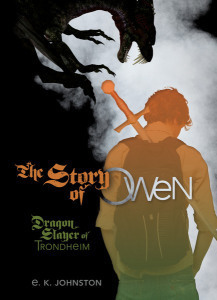
Carolrhoda LAB, March 2014.
I learned two lessons from CATCHER IN THE RYE, in the end. The first is that a person you admire very much might love a book and make you read it, and then you have to come up with a way to tell them that you rather felt like poking your eyes out with a spork the whole time you had it. The second is more applicable to the topic at hand.
Banning books is reactionary by nature, and the people who are doing the banning are very rarely the target audience of the book. Children and teenagers are much better at self-censoring and understanding things than they are given credit for. Banning a book might give them more of an impetus to read it (best case: they sneak into the public library every day for two weeks to read THE CLAN OF THE CAVE BEAR and then have to look up the sexy bits in Gray’s Anatomy because if they ask direct questions, they’ll be found out), but generally speaking, banning books serves only to make the banner appear short sighted (at the time) and woefully out of touch (when the book is finally reintroduced).
The key, as usual, is to read. Read, and then talk about what you’ve read. If you have an issue with a book, discuss it. Listen to some who disagrees with you on the matter, and then try to come to some sort of middle ground. Banning it outright, cutting off that conversation, stifles any development or forward movement. If boundaries never get pushed, then we all get very crowded. It’s not a very good place to be. How lucky for us that the solution is so simple.
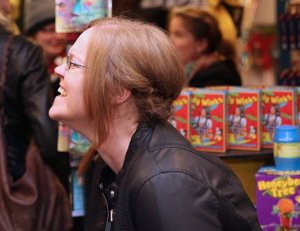
E.K. Johnston.
Emily Kate Johnston is a forensic archaeologist by training, a bookseller by trade, and a grammarian by nature. Someday, she’s sure, she’s going to get the hang of this whole “real world” thing, but in the mean time she’s going to spend as much time in other worlds as she possibly can.
When she’s not on tumblr, she dreams of travel and Tolkien. Or writes books. It really depends on the weather. She lives in Ontario.
Visit her online at ekjohnston.ca.




September 8, 2014
Banned Books Month: Guest Post from Marsha Forchuk Skrypuch: Forbidden Histories
I looked down at the long meandering line-up of kids who were all waiting for an autograph. Clutched in their hands were love-worn copies of , MAKING BOMBS FOR HITLER, and UNDERGROUND SOLDIER – three of my most recent books.

Scholastic Canada February 2012/Scholastic Canada January 2014.
The venue? London, Ontario, Canada’s first-ever Forest of Reading event at the Western Fair Grounds. Nineteen hundred students had been bussed in from all over the city. In order for a student to attend, they had to have read at least five of the ten nominated books in one of the Forest of Reading award categories.
I was there because my book, ONE STEP AT A TIME had been shortlisted for the Silver Birch non-fiction award (I ended up winning). The previous year, I had won the Silver Birch Fiction award for my novel, MAKING BOMBS FOR HITLER.
From those book titles, you can probably guess that I write stories based on the real lives of kids who have suffered through war. I’ve been asked why I am passionate about writing about kids and war. The answer is simple: the only way to stop war and hate is to have a reader step into the shoes of someone who is experiencing it.
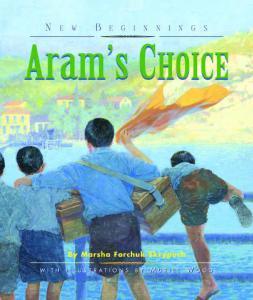
Fitzhenry & Whiteside, May 2006.
One girl approached me, her steps tentative and eyes cast down. “Are you the author who wrote ARAM’S CHOICE?” she asked.
“I am,” I said, expecting an excited grin.
ARAM’S CHOICE had been a Silver Birch Express nomination a few years ago and it was one of my personal favourites: Based on the true account of a 12 year old orphaned Armenian boy from Turkey who had been exiled in Greece in 1923 with thousands of other Armenian children whose families had been killed in the Genocide. Canada sponsored 109 boys to come to Canada and my book was about one boy’s transition from a starving street urchin to a young Canadian farmer and student. Some of his experiences were funny, some were sad, but what they all had in common was fact. I had done exhaustive research, including listening to archival interviews of those 50 boys once they’d been in Canada for a number of years.

Marsha at the Western Fair Grounds on the day that hate literature was handed to her. The kids in the photo are her sign bearer and speech giver
The child who stood before me did not grin. Instead, she slapped a thick stack of glossy papers onto my signing table. “You should read these,” she said, then turned and walked away.
From her tone, I knew what those papers were. I didn’t want to be seen with them. I stuck them under my chair, pasted on a smile and kept on signing.
When I had a chance to look at the papers, they were just as I expected: Material that demonized Armenians and claimed that there was no such thing as the Armenian Genocide. When ARAM’S CHOICE had been a Silver Birch nominee, there had been a campaign to get it removed from the shortlist. That campaign failed.
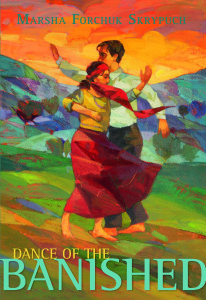
Pajama Press, August 2014.
My heart went out for that young girl. She was obviously smart and an avid reader, but had she ever read ARAM’S CHOICE?
Aram was about her age and quite possibly from an area where she has relatives. Yet Aram’s story was not to be told because of his forbidden history. My heart aches for that girl and others who are being raised in an atmosphere of hate.
I have a new book out, this one for teens, and like ARAM’S CHOICE, DANCE OF THE BANISHED is about survivors of war. It explores a bit of history that few people know about – the internment of “enemy aliens” in Canada during World War I, but also what happened to the loved ones who didn’t immigrate but were plunged directly into war.
My own Ukrainian grandfather was interned as an enemy alien in Canada and to his dying day, he never forgot the shame of it. His sister and mother survived World War I, but both perished in World War II.
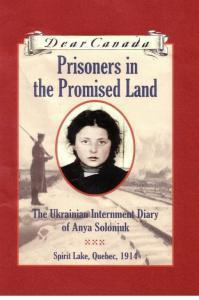
Scholastic Canada, October 2007.
Most of the people interned in Canada were Ukrainian and I’ve written two books on that subject (SILVER THREADS, PRISONERS IN THE PROMISED LAND), but there was also a mysterious group of men – not Ukrainian – from my own home town of Brantford Ontario who were rounded up in the middle of the night and jailed on the false charge of treason, then later sent to an internment camp in the wilds of northern Ontario. DANCE OF THE BANISHED was inspired by that incident.
DANCE OF THE BANISHED is a love story about Ali and Zeynep, set in Ottoman Turkey just at the time of the Armenian Genocide and World War I, but Ali and Zeynep are not Armenian and they are not Turkish. They’re Kurds who practice a very old religion known as Alevism. They pray by performing a ritual dance, known as the semah.
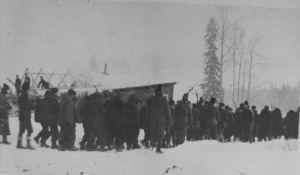
An archival photo of the men from Ottoman Turkey interned in Kapuskasing Ontario. Photo credit for that is: Courtesy Ron Morel Memorial Museum, Kapuskasing Ontario.
Ali comes to Canada first and saves his money to bring Zeynep, but when war breaks out, his hopes are dashed. He’s arrested as an enemy “Turk” and thrown into a Canadian internment camp. Zeynep is an eye-witness to the deportation of her Armenian neighbours. She cannot stand by and let this happen. With other Alevis, she rescues thousands, but dreams of a day when she and Ali can be reunited.
I consider myself a librarian-detective-writer and it took all of my sleuthing skills to untangle the real forbidden history that is the foundation of this love story. Will there be others in line-ups, poised to give me hate literature because I dared write this book? Perhaps. But I hope some will open the novel and read it, because the only way to stop the cycle of hate is to step into the shoes of someone who is experiencing it.

Marsha Forchuk Skrypuch
Marsha Forchuk Skrypuch prides herself on being the only children’s author in Canada who is a dyslexic princess, and has received death threats and hate mail (she also sold grinding wheels for four years, but that’s a different story). She’s won oodles of awards and has written nineteen books. Her most recent book is DANCE OF THE BANISHED, a young adult novel published by Pajama Press, in fall 2014. Her website is www.calla.com





September 5, 2014
Banned Books Month: Guest Post from Jenny Lundquist: Censorship vs. Parent Involvement
I travel in many different circles. During the day I’m a writer, pounding away on my computer and hoping to reach my daily word count by 2:30pm. After that, I transition to Mom Mode and help with homework, sign permission slips, make dinner and generally keep my two boys from destroying the house before bedtime. (If I could bottle boy energy, I’d be a bazillionaire!)

Running Press Kids, October 2014.
So it’s not unusual that on any given day I’m interacting with writers and artists from all walks of life, as well as PTA parents and soccer moms, both online and in real life. Sometimes these two worlds seem to eye each other uneasily, and that saddens me.
As a mom, I am 100% for parent involvement, and I support a parent’s right to make the best choices they can for their own children. I welcome it, even. Can you imagine how different this world would be if every parent cared enough about their child that they were concerned with his or her reading material?
But, as a writer, I am 100% AGAINST banning books.
What may be inappropriate or “too much” for your son or daughter may be exactly what another child/teen needs to hear.
[Alert: Spoilers Ahead. Stop Reading if you haven’t read SPEAK]
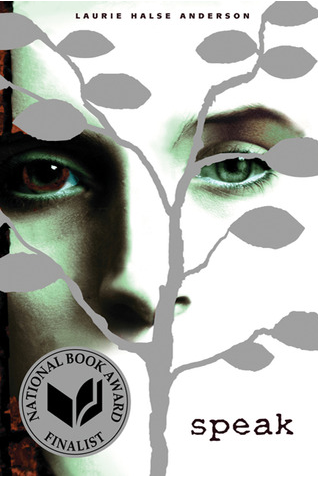
Squarefish, Reprint Edition, May 2011.
Case in point: A few years back someone got it in their head to ban SPEAK (again). SPEAK is Laurie Halse Anderson’s masterful story of a girl who literally stops speaking after experiencing date rape. They wanted to ban it because of its sex scenes, and considered it child pornography. (But let’s be clear here. The scenes referenced are RAPE scenes, not sex scenes, and the fact that many either couldn’t or wouldn’t distinguish between the two I still find deeply disturbing and horrifying).
I was so moved while reading SPEAK—and upon finishing it I immediately wished I’d had it years ago when I was younger. I was lucky enough that I have never experienced date rape or any form of sexual abuse—but I had friends who did. And I wished I could have given my friends this book and said, “Look! This is what rape looks like sometimes! It’s not always about the monster hiding behind the dark corner. Sometimes it’s the monster you didn’t recognize sitting right next to you! And it’s not your fault!”
And as a former youth counselor, I wished I could’ve given it to some parents I’d known and said, “Look! This is what it can look like when your child has been traumatized! Don’t write her off as a smartass or a teenage brat. When a teenage girl stops speaking, something is wrong, dammit! Something is wrong—and it’s your job to find out what.”
Real life won’t shield our children from the harsh realities of the world we live in. And for a lot of book lovers (myself included), reading fiction is how we make sense of our own life. Watching a character walk through a hard situation and seeing how she fares, and the consequences she faces as a result of her actions, gives us insight into how we might handle that same situation. Don’t deny us that opportunity because you think you know what children or teens should or should not be reading.
Supporting parent involvement means I understood (and agreed) when my friend decided that THE HUNGER GAMES was just way too much for her sensitive fourth grader. It also meant I supported my other friend who decided she didn’t want her high schooler reading DIVERGENT (though I don’t personally agree, I wished she would have instead read it with her high schooler, and talked to her about her concerns).
But telling everyone else they can’t read a book because you don’t approve?
No. Just no.
For those of us who use fiction as a means of understanding our world, you could be depriving us of the very book we require to take the next step toward healing and wholeness. Please think about that before you decide to ban the next book that offends you.
No, really. Think. About. It.
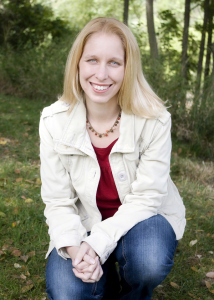
Jenny Lundquist.
Jenny Lundquist was born and raised in Huntington Beach, CA, where she spent her time unsuccessfully learning how to surf. When she was younger, she wanted to be either a rock star or a published author. After she taped herself singing and listened to it on playback she decided she’d better opt for the writing route. Jenny is the author of THE PRINCESS IN THE OPAL MASK and THE OPAL CROWN, as well as the middle grade titles SEEING CINDERELLA and PLASTIC POLLY. Visit her online at www.jennylundquist.com.





September 4, 2014
Banned Books Month: Guest Post from Emmy Laybourne: Hey, are you banning your OWN book?
Do you have about a hundred pages of a novel languishing on Dropbox?
Or is there a story rolling around in the back of your mind that you plan to get to “someday”?
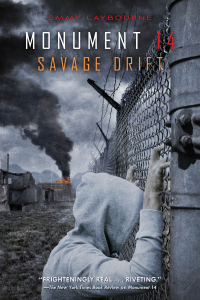
Feiwel & Friends, May 2014.
Is there a tale that you’re drawn to tell, but you won’t, because it’s too risky (or dirty, or weird, or emotional, or embarrassing)?
If you’ve answered yes to any of these questions, you may be getting in the way of your own creative process. I’m a novelist, but in my former life as an actor, I did a lot of comedy improvisation.
Improv is a strange beast. You may have heard that the golden rule for improv is saying “Yes And.”In a scene, actors are to stay open to the offers of their scene-mates (yes-ing them) and then adding to the direction of the offer (And…). In this way, moment by moment, a scene unfolds on stage and a story is told.
While it’s highly collaborative, the most important part of an improviser’s training happens inside the mind. A good improviser learns to say Yes to their own ideas And then add to them. How do they do this? They train themselves to get out of the way! In improv, we don’t judge our ideas – because how could you say Yes to an idea if you’ve decided that it’s a cruddy, stupid, silly idea?
It helps, when you’re improvising, that everyone is throwing out cruddy, silly, stupid ideas all the time! If you’re doing a scene where you’ve somehow become a mermaid singing to a sailor, and the sailor only speaks Chinese and you have to use google translator to communicate – you’re less inclined to dismiss the idea of using a “shell phone.” A shell phone suddenly seems pretty dang brilliant.
But what about when you’re writing? All alone. No audience. No scene-mates to say Yes And to your mermaid tail and your shell phone and your sea slug earpiece (I just made that up)?
That’s when your inner critic starts talking and man, is that guy a jerk. He’s going to tell you that you’re no good. That you’re wasting your time. He’ll whisper that your idea is too thin to hold up for 300 pages. That the idea you had that fired up your brain was just a side effect of caffeine and that your prose is insipid and impotent. Your inner critic thinks you should get a job cutting dog’s toenails or raking gutter leaves or selling single matches on the street – you should do anything but write.
I really hate that guy.
As artists, we’ve got to park that inner critic in the corner if we’re ever going to get anywhere.
The good news is that once you’re aware of him, it becomes easier to Yes And yourself. And you can train ourselves to say yes. Outside of taking an improv class (which I highly recommend), try this exercise. Try it everyday for a week, just as a writing warm-up, and see if you don’t feel a bit more elbow room in your creative mindspace.
Yesworthy
This is a 2 step exercise:
Go to upworthy.com and find a headline that intrigues you.
Now write the rest of the story, using “Yes And”as the first words of each and every sentence.
I did it to give you a little example of how it might go:
Her Feet Didn ’t Touch The Ground For 449 Days, All Because Of Something That ’s Over 400 Years Old*
Yes, and that something was an ancient foot powder found in a small ceramic urn.
Yes, and after she put it on, her feet would not touch the ground no matter what she did.
Yes, and she had to sleep with her feet floating above her while her body lay on the mattress.
Yes, and when she bought shoes the salesman had to get out a ladder.
Yes, and the salesman could see up her skirt.
Yes, and everyone could see up her skirt.
Yes, and she took to writing slogans on her underwear, to advertise for worthy causes…
Okay, you can see this story is getting loopy. That’s fine! That’s what it’s supposed to do. It also kind of went in two different directions, first I wrote something about sleep, then I had a thought about a shoe store. Who cares? I’m not giving this to Holly West**. I’m just writing this for me (okay, and to use as an example for this article). The point is: have fun. Go to new places. Play, play, play.
If you’re not open to the creative flow of your own ideas – your own strange and wonderful ideas – you may be banning your own book. And so, in honor of Banned Books week, I urge you to honor yourself by giving expression to your creative impulses – no matter how wild, odd, uncomfortable or unexpected and get writing!
* Shout out to upworthy.com. I got this directly from your site. Please nobody sue me.
** My editor at Macmillan. I’m crazy about her. Hi, Holly!
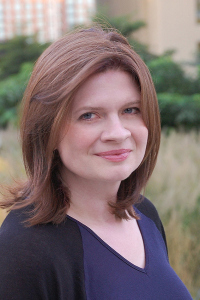
Emmy Laybourne.
Emmy Laybourne is a novelist, screenwriter and former character actress. Emmy’s Monument 14 trilogy has earned critical praise (“Frighteningly real…riveting” – New York Times Book Review, Editor’s Choice) and has been nominated by readers to the YALSA Teens Top Ten in 2013 and 2014. Before her life as an author, Emmy performed original comedy on Comedy Central, MTV and VH1; and acted in the movies “Superstar,” “The In-Laws” and “Nancy Drew,” among others. Emmy lives outside New York City with her husband, two kids and a flock of 8 nifty chickens.
Follow Emmy on Instagram, Twitter or like her over Facebook. And over at www.emmylaybourne.com you’ll find giveaways and the latest news on the “Monument 14” movie deal.





September 3, 2014
Banned Books Month: Guest Post from Deborah Ellis: On International Censorship
Banned book week is a time for us to remember the power of ideas and to express our appreciation for those who, through history, were afraid of the consequences of writing the truth – and wrote it anyway.
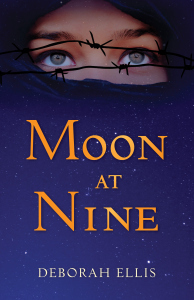
Pajama Press, April 2014.
It is not just the writers of banned books who should be celebrated. We should also celebrate those who published the books, those individuals who put their jobs and businesses on the line to get ideas out into the public consciousness. The booksellers who bravely stocked controversial books on their shelves risked losing their customers and having their door shut. The newspapers who reviewed ‘dangerous’ books, the teachers who promoted them, the readers who dared to read them – all are worthy of remembrance and honour during Banned Book Week.
For the past fifteen years I have been writing – and getting published – books for young people. To me, this is a special trust. No matter what the situation is that I write about – war, leprosy, violence, racism – the book needs to end on a hopeful note. A hopeful note is different from a happy note. Young readers are smart enough to know that the world does not always provide us with happiness, and to end a book happily is sometimes just not true. Ending on a hopeful note means that the characters who are dealing with whatever challenge they are facing are a little bit stronger, a little bit wiser, a little bit more able to deal with whatever the world is going to throw at them next.
I believe it is necessary to end books for young people on hopeful note because that helps them to feel they have the power to act to change for the better whatever difficult situation they happen to be in, even if that change is only small and only within themselves.
While I believe in hopeful endings for young people, I also believe that whatever we do to kids in real life, we should not shy away from reflecting in their literature. If we are too ashamed to let them read about it, then we simply shouldn’t be doing it.
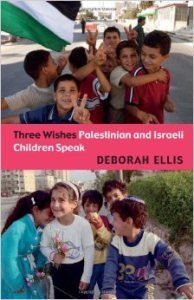
Groundwood Books, May 2004.
In 2004, my book THREE WISHES: Palestinian and Israeli Children Speak was published by Groundwood Books. THREE WISHES contains a couple of dozen interviews with Israeli and Palestinian children talking about what their lives are like in that amazing, troubled part of the world. The interviews are not easy to read. Some speak about their homes being bulldozed, their friends being shot, long waits at checkpoints, fear of going into the army, and sisters who were suicide bombers. They also speak about liking horses and wanting to be singers and looking for ways to be leaders for peace.
The book was well received and was placed on the Ontario Library’s Silver Birch list. This is part of a wider Forest of Reading campaign that encourages kids to read, debate and vote on books. The kids can choose which books on the list to read.
That’s when the difficulties started.
People started complaining to their school boards about their children reading this book. Some felt that the situation in the Middle East was too complicated for kids in Middle School to understand. Others felt that having a point of view expressed that was not their own would be harmful to kids.
In the end, a couple of school boards withdrew the book from their school libraries. In one board, kids could read the book only with a letter of permission from their parents, and the book was kept under the librarian’s desk, hidden away.
In response, many teachers bought the book with their own money and used it in their classrooms in a more intense way than it would have been used had it not been questioned. Many parents bought the book for their children and they read it together as a family.
The debate over THREE WISHES got a lot of coverage in newspapers and other media. I think the debate was a good one, even though it was difficult for me at times. It is good to talk about books. It is good to talk about war. And it is good to talk about what we expose children to, and how we can create a world where we don’t have to have things happening that we wish our children did not have to know about.
My latest book is called MOON AT NINE (Pajama Press), and is based on the true story of two teenaged girls who fall in love with each other in l980’s Iran. I look forward to seeing the discussions that come about as a result of this book.
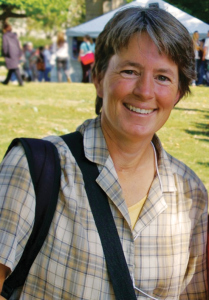
Deborah Ellis.
Deborah Ellis is the internationally acclaimed author of nearly thirty books for children and young people, most of which explore themes of social justice and courage. A peace activist, feminist, and humanitarian, Deborah has won many national and international awards for her books, including the Governor General’s Award, the Ruth Schwartz Award, the Vicky Metcalf Award, the American Library Association’s Notable List, and the Jane Addams Children’s Book Award. In 2010, she received The Ontario Library Association President’s Award for Exceptional Achievement. Deborah lives in Simcoe, Ontario.





September 2, 2014
Banned Books Month: Guest Post from Carrie Mac: Dear Book Banner…
Dear Book Banner,
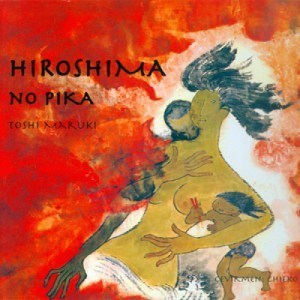
Lothrop, Lee & Shepard, August 1982
We’ve met, a few times now. Often enough that I can usually see you coming.
We have history, you and I.
When I was a little, you were the teacher who took LITTLE BLACK SAMBO right out of my hands, never mind what I think of it now.
You were the librarian who saw me return HIROSHIMA NO PIKA and promptly pulled it from the children’s collection.
You were the other librarian who said I was too young to sign out anything by Stephen King or anything else from the adult collection, for that matter.
My mother took care of that. Thanks, Mom.
You were my friend’s mom who wouldn’t let her read DEENIE because of the masturbation scene.
You are the copy editor who I argue with over words like fuck, or cocksucker, or retard, no matter the context.
You are the parents who email me and tell me that my books are filth, yet you never seem to articulate why, other than the simplest of vitriol.
You are that parent at the park who told me that the author of CAPTAIN UNDERPANTS should be shot.
You are the school principal who won’t book me to speak because I always make a point of coming out as queer when I present to schools.
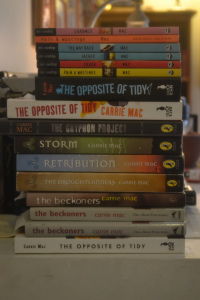
A stack of Carrie Mac’s books.
You are the school district that banned THE BECKONERS altogether, just because one parent accused it of being vulgar and offensive.
But worse, you are all the people who have the power to bring books to children and teenagers, and simply don’t.
You don’t even let the books into your libraries, classrooms, bookstores, or home bookshelves in the first place.
This is perhaps your worst offense. Because if your kid or student or patron never meets the book in the first place, you’ve denied them the chance to make their own decision about it.
That book that mentions child abuse that your nine-year-old student doesn’t read because it’s not there? It could’ve stopped what was happening at home.
That story about the queer teenager who comes out and everything turns out absolutely okay? That might’ve stopped him from hanging himself.
That story about the kid with two moms? That would’ve gone a long way to spreading acceptance.
That picture book about the boy who loves to wear dresses? Better to let him see himself represented than to give him the impression that he is a freak all alone in the world.
The trilogy that challenges the very existence of God? It could’ve deepened your teenager’s faith.
Those books about witches and fairies and zombies? Those are imaginary creatures, hon. It’s just a good story. Your kids knows that.
They’re not going to turn into a witch, or a fairy, or a zombie.
Well, probably not. And even if they did, they probably would have anyway, whether they read a book about it or not.
I want to let you know, dear Book Banner, that I’ve struggled with my own urge to get rid of a book in my local library.
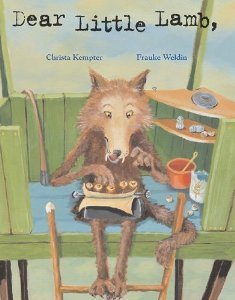
North-South Books, August 2006.
It’s called DEAR LITTLE LAMB, and it’s about a wolf that lures a lamb to meet him, showering her with sweet words and promising her all kinds of treats if she secretly runs away with him. When the lamb’s mother finds out, she foils his predatory plan, but instead of getting justice, the she flees with her lamb, all the way to Australia to get far, far away from the wolf’s clutches. This is a picture book. That my kid read. About a child predator who gets to move on to his next victim.
I don’t think it should be in the library.
I don’t think it should’ve been published.
And I told our librarian so. I asked why they’d order such an awful book in the first place?
She said that they never remove a book from circulation based on a complaint about the content.
Of course they don’t. And once I calmed down, I thanked her for that.
Because if they did pull books whenever there was a complaint, there wouldn’t be many books left on the shelves.
So I did what I ask of other people; I used the story to talk to my kids. Which is likely what the author had in mind when she wrote it.
We talked about how the lamb should’ve talked to her mama right away. And how it’s never okay for a grown-up to ask a child to keep secrets, no matter what.
Oh, dear Book Banner, this letter could go on, and on.
We have so much to talk about.
But for now, know this; I’m not here to tell you to go away.
I’m not even going to ask you to stop.
I get that you think that you’re doing the right thing. The righteous thing.
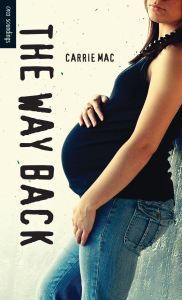
Orca Soundings, September 2014.
So you and your buddies can go right ahead and keep shouting about that offensive book. You keep waving it around, and generally making a fuss like so many chickens squawking and clucking and being miserable.
Go ahead and flap those wings.
Light your matches and burn away, because in doing so, you’re sending a message to the rest of us.
You’re telling us that something in that book made you angry. Or ashamed, or embarrassed, or afraid for your children.
You’re telling us that the words the writer strung together into a book shape made you FEEL.
And so they should.
All writers want their readers to feel.
That means that we did our job well, and we moved you.
What you do with that emotion is up to you.
And what I do with that emotion is up to me.
In time, your students and children and patrons will read past your limits, your fears, your ignorance.
Their curiosity will take them those places you wouldn’t let them go, or that you never let them know existed.
They will find the books about themselves.
They will read the stories that make them feel, and they will form their own opinions, independent of yours.
In the meantime, you go ahead and keep banning books.
One thing is true of every book that has ever been banned; it gets a huge amount of attention, and as a result, more people read it.
And then they talk about it.
Mission accomplished.
So, thank you for encouraging the conversation.
And as a writer whose books have been banned, thank you for the boost in sales.
Sincerely,
Carrie Mac
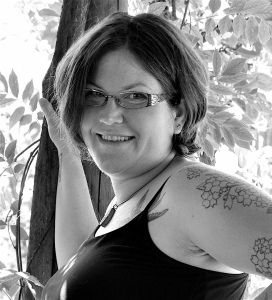
Carrie Mac.
Carrie Mac is the author of ten novels for teenagers. She is also the resident storyteller at www.thestoryforest.com. She lives in Vancouver with her partner and two children.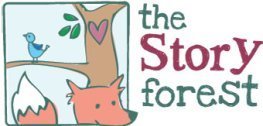





September 1, 2014
Banned Books Month: Guest Post from Adam Selzer: Think of the Children!
Back in 8th grade, everyone in my class had to pick a controversial subject and give a presentation about it. Fresh from the heartache and humiliation of having to sell my copy of Nine Inch Nails’ Downward Spiral album at CD Exchange because my mother had noticed the dreaded “parental advisory” sticker, I chose censorship as my topic. I set up a copy of TO KILL A MOCKINGBIRD on the marker board and paced up and down the room, having read all the articles I could find in the library on the subject but manifestly unprepared to make a speech about it. Falling back on rage over organization, I began by saying “Censorship………..is bad.”
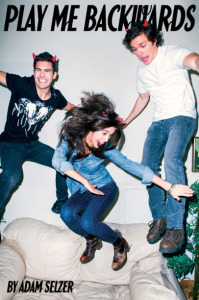
Simon & Schuster Books for Young Readers, August 2014.
I think I got a B in the end, having bullshat my way through a full eight minutes. I remember that the list of banned books I found said that MOCKINGBIRD had been challenged because it contained the word “rape,” which seemed utterly absurd at the time (this was decades before most people had heard of “trigger warnings,” if the term even existed yet).
Right now, there’s a lawsuit being brought against the very school district where I gave that speech by a student who says that the school’s dress code doesn’t allow him to express his religion, which is Satanism. I’m amused by this to no end, because it’s a scene right out of PLAY ME BACKWARDS, my new “Satanic” YA novel, in which a Des Moines-area slacker enlists the help of a guy who claims to be Satan to help him turn his life around. There’s even a showdown over whether should be able to have Satanic messages in a yearbook if you can have Christian ones. Some people have warned me that I might find some trouble with the censors over this one.
I should be so lucky. My own first book, HOW TO GET SUSPENDED AND INFLUENCE PEOPLE, was challenged a couple of times that I heard about; the most notable was at the Nampa, Idaho public library, where a woman wanted it removed from the library altogether. It was a slow enough news week in Boise that it made all of the media outlets there – you can see a news clip at http://www.kboi2.com/news/local/65713872.html?tab=video ). You can probably guess what happened on my end: it was the best publicity I ever got. The book was nearly three years old and pretty much out of print by then, certainly long out of the handful of stores it had ever been in, but the sales spiked to what I’m sure was their strongest point in the life of the book. And that was just for a news story that barely got out of Idaho.
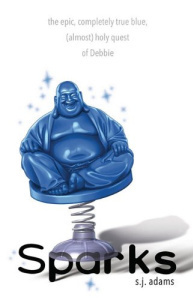
Flux, November 2011.
But all of the swearing, sex, faux-satanism, soul-selling, and drug references in PLAY ME BACKWARDS aren’t necessarily going to get it banned. I’ve spent years going against book banners (I tended to live in towns where it happened a lot), and there’s one common thread: the would-be banners never actually read the books they object to. The actual content is not important. The books in question are pretty much arbitrary; the idea is just to go after one and establish precedent that will give them further control over the content in town, and further push their vision of a world more like The Waltons than The Simpsons. In SPARKS, a book I did under the name SJ Adams, a girl stops pretending to be a straight methodist and starts being more open about being gay, and joins an openly-made-up religion. I sort of thought they’d come after me a bit on that one, but if anyone tried any funny business, word never got back to me. Someone going for PLAY ME BACKWARDS is probably going to be luck of the draw. And I do mean “luck.” Publicizing a book when you’re not already famous or riding a big trend is hard.
So, uh, for those of you just trolling through blogs looking for your next target to censor: this book is evil. EVIL. People have sex in it. Some of them take drugs. There are lots of poop jokes. Lots of them. And swearing – boy, do these characters swear! They pick on a guy who comes into an ice cream parlor to spread religious tracts. They have a pro-Satanism rally at school, with pentagrams and t-shirts and everything. There are references to kids defacing the Bibles that religious people sometimes pass out just off campus (which sure happened at MY middle school, let me tell ya). Evil! Won’t somebody PLEASE think of the children?
And when the super-volcano blows and we’re all running for our lives from the maelstrom of ashes, I’m sure you can look back at all the effort you spent fighting against certain synonyms for “excrement” appearing in novels for young readers, and smile softly, as the ash burns through your cheeks, at a life well lived.
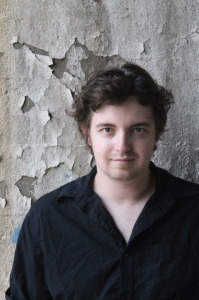
Adam Selzer.
Adam Selzer is an author and historian in Chicago. His new book, PLAY ME BACKWARDS, is a novel for young adults who worship the devil. No censor to his knowledge said a word about one of his earlier books, in which the characters steer a Wells Fargo Wagon full of unicorn turds through the streets of Des Moines towards the dance…. He’s @adamselzer on twitter, and on the web at adamselzer.com






